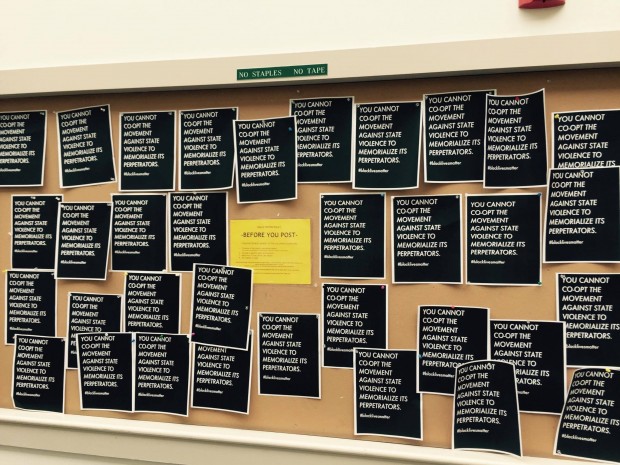Dartmouth has a problem. Its campus climate is toxic, but not in the way that student protesters often claim. The recent conflict surrounding the Dartmouth College Republicans’ Blue Lives Matter display is only the latest manifestation of this culture. The College has failed—not just the College Republicans—but the student body at large. It has, unintentionally or not, taught students the wrong message regarding respect, civility, and the fundamental right to free speech.
Student protesters have complained that the Blue Lives Matter display “co-opted” the Black Lives Matter movement as justification for their actions. There are several problems with this argument that need to be unpacked.
First is the free speech issue, which has by now been addressed ad nauseam. Nevertheless, what has been said is worth repeating. One must give President Hanlon credit where credit is due. His response to the vandalism of the Blue Lives Matter display was as forceful as could be expected. The right to free speech protects the Black Lives Matter protesters’ often controversial and inflammatory message; to deny others that same right is simply tyranny. It is troubling that we are still having a debate about free speech in this day and age.
More problematical, however, is the presupposition that Black Lives Matter is somehow beyond reproach. It is more than slightly ironic that a group decrying racial privilege believes its opinions to be privileged above all others. If even an unintentional slight to the Black Lives Matter movement such as the Collis display generates such backlash, then one can only imagine the response to actual criticism.
The fact of the matter is that the substance and tactics of the Black Lives Matter movement ought to be challenged. A claim of injustice, proven or not, does not somehow make a group above scrutiny; it certainly does not give one carte blanche to harass bystanders in a library. Dartmouth’s Black Lives Matter protesters, in particular, seem to enjoy manipulating bystanders’ sympathies and playing the victim card to score political points. Its members often claim to feel “unsafe,” an honestly nonsensical claim for privileged students on a rural New Hampshire campus protected by doting administrators. Regarding law enforcement action in Hanover, it seems that it is drunken frat boys who receive the short end of the stick, which is not exactly the textbook definition of police brutality.
The Black Lives Matter protesters think themselves courageous, when in fact their actions can only be described as cowardly. Rather than meet the ideas of others head-on, they censor and intimidate opposing voices while hiding behind a veneer of collective action to avoid individual accountability. Their reasons for doing so are very clear: beyond its gaping credibility issue, Black Lives Matter is a movement devoid of substance, one whose obsessive identity politics do not coincide with reality outside the ivory tower.
There seem to be no concrete objectives in the Black Lives Matter movement. There has been no coherent message beyond the allegations of mass state violence directed toward African Americans and the general affirmation that black lives matter. The movement then goes on to falsely conflate the two, accusing anyone who questions the first assertion of also questioning the latter (that is, accuse anyone who dares criticize the movement of being racist). Providing nothing more than irrational anger, Black Lives Matter collapses on its own weight; its allegations of mass, racial state violence are simply untrue.
Black Lives Matter has made a farce out of serious criminal justice and law enforcement issues. Rather than effect positive change, Black Lives Matter seems to be intent on agitating as loudly, as antagonistically, and as ineffectively as possible. Many commentators have pointed out that Black Lives Matter has done nothing but polarize any community it touches, to which Black Lives Matter protesters respond by doubling down on the same losing strategy.
If anything, the Black Lives Matter movement has co-opted the message of civil libertarians who have been fighting for criminal justice reform and accountability for law enforcement officers for decades. Issues such as stop-and-frisk in New York City, aggressive policing in minority communities, and police militarization are not new. Let it not go unsaid that it was black leaders who pushed for tougher policing and drug sentencing laws in the 1980s while civil libertarians cried foul.
Kentucky Senator Rand Paul has consistently and constructively advocated meaningful reforms to the criminal justice system well before the hashtag #blacklivesmatter even existed. His ideological compatriots, Texas Senator Ted Cruz and Utah Senator Mike Lee, were onboard as well. Since then, Sen. Cruz has done an about-face, ambushing Sen. Lee over his reform bill in committee while accusing Black Lives Matter of “literally suggesting and embracing and celebrating the murder of police officers.”
Rather than win converts, it seems clear that Black Lives Matter has done nothing but turn potential allies such as Sen. Cruz into reliable adversaries. It scuttled what could have been a cross-ideological consensus that brought to light serious issues while repudiating the mistakes of the past. For this, the Black Lives Matter movement has no one to blame but itself.
If, contrary to fact, the goal of the Blue Lives Matter display in Collis was indeed to subvert Black Lives Matter, it would still have been a valuable public service. It is unfortunate that the Black Lives Matter movement has devolved to the point where it is counterproductive, but it is certainly not too late to change that.


“Black Lives Matter movement has no one to blame but itself.”
https://www.youtube.com/watch?v=dBp2w8r17AE
Great article.
http://www.spiked-online.com/newsite/article/the-problem-with-black-lives-matter/18643#.V6xifa3KjRc
I’m a far left liberal, and I agree with everything in this article.
This is gaslighting plain and simple. We kneel on your neck, we kill you in record numbers, but if you protest for equality we say you ask for racial privilege.